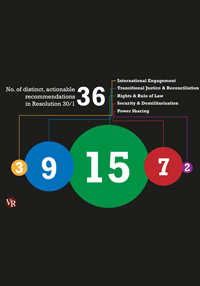මැඞ්රිඞ් ප්රොටෝකෝලය යනු වෙළද ලකුණු විදේශයන්හි ලියාපදිංචිය සදහා ඇති සරල, ගෝලීය ක්රමවේදයකි. ශී්ර ලාංකික ව්යාපාරවලට වෙළද ලකුණු විදේශ රටවල ලියාපදිංචියේ දී මුහුණදීමට සිදුවන දුෂ්කරතාවයන් එමගින් සමනය කරගත හැක.මැඞ්රිඞ් ප්රොටෝකෝලයෙන් ප්රතිලාභ ලබාගැනීමේ දී, වෙළද ලකුණු ශී්ර ලංකාව තුළ ලියාපදිංචි කිරීම තීරණාත්මක පළමු පියවරකි.
The Madrid Protocol is a simplified global system for registering trademarks abroad. It eases trademark registration abroad for Sri Lankan businesses. Sri Lanka is looking to complete accession to the Madrid Protocol by the end of 2017 or early 2018. However, accession to the Madrid Protocol will not necessarily help address the related challenges faced by Sri Lankan business; the challenge of registering trademarks in Sri Lanka. Verité has conducted research on the challenges faced in the process of registering trademarks in Sri Lanka and how these challenges undermine the benefits of the proposed accession to the Madrid Protocol. This policy brief presents an analysis of these issues and provides recommendations to overcome the identified obstacles.
The original version of this report was commissioned by the Westminster Foundation for Democracy to assist in its work in Sri Lanka with the Sri Lankan parliament and political parties. The opinions expressed and contents of this report are not necessarily those held by Westminster Foundation for Democracy. The report was prepared by the politics research practice at Verité Research with Charudaththa Ekanayake functioning as principal researcher under the overall editorial supervision of Janeen Fernando.
Sri Lanka’s exports are heavily concentrated on a few markets and a few products. The government’s recognition of export diversification as an important policy strategy to revive exports, indicates that both market and product concentration are seen as critical bottlenecks in this regard. This report compares and contrasts Sri Lanka’s export product and market concentration and its export composition against that of the world and selected Asian economies. The objective of this brief analysis is to understand where Sri Lanka stands in the world and in comparison to its neighbours that have performed well in terms of export concentration and composition.
Analysis of past budgets reveal large deviations between budgeted allocations and actual expenditure. This shows that expectations set by the government during the budget speech are not honoured. This Insight analyses budgeting on social services and the rural economy to demonstrate the extent of deviations in promised allocations and actual expenditure. Results suggest that when precise expenditure is not tangible, it is easier to renege on budget promises.
Criminal justice institutions re-victimise children. This report details the legal and institutional challenges impeding justice for children in Sri Lanka. The report also details specific recommendations to divert children away from the justice system, and prevent institutionalisation being a matter of first resort.
The report Right to Information: Discourse and Compliance in Sri Lanka was compiled in collaboration between Verité Research and Democracy Reporting International (DRI). Verité Research analysed the right to information in the Sri Lankan context while Democracy Reporting International detailed international best practices relating to proactive disclosure. The study examines the drafting of Sri Lanka’s RTI Act and existing laws that are inconsistent with its provisions. It recommends strategies to strengthen proactive disclosure of information, and to amend laws inconsistent with the RTI Act.
The recent Court of Appeal judgement on SLFP MP Geetha Kumarasinghe’s disqualification from Parliament due to her dual citizenship has sparked a debate on whether the disqualification of candidates invalidates nomination papers. This briefing note discusses this issue and argues that nomination papers cannot be invalidated on the basis that a candidate is disqualified from being elected to parliament.
There are several causes to the problems facing Sri Lanka’s economy. The problem of bureaucratic inefficiency exemplified by this case study: finding information about trade regulations is a significant barrier to improving the economy in agricultural products. The poor performance in the supply of even basic information indicates the larger challenge of improving the bureaucracy.
This briefing note is Verité Research’s latest study on the Sri Lankan government’s commitments on reconciliation and accountability. It assesses progress in the fulfillment of 36 commitments made in UNHRC Resolution 30/1, co-sponsored by Sri Lanka in September 2015.








